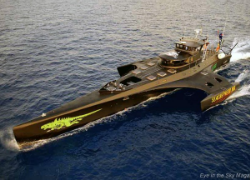
It has been both interesting and informative to watch the debate over the meaning of piracy’s “private ends” requirement unfold between Kevin Jon Heller and Eugene Kontorovich at Opinio Juris and The Volokh Conspiracy, respectively. Over a series of successive posts (here, here, here, here, and here), they began to home in on the real crux of the “private ends” issue, but Kevin’s latest post led that debate somewhat astray.
Kevin notes that Australia claims a 200nm EEZ off the coast of certain parts of Antarctica, has passed a law prohibiting whaling in that EEZ, and has issued an injunction against the Japanese “researchers” who in fact whale in that EEZ. He further notes that France, New Zealand, Norway, and the United Kingdom have recognized that EEZ. All of these are true facts, to be sure.
From these premises, however, Kevin concludes that Australia claims “sovereignty” over the Arctic EEZ, excluding any actions occurring therein from the common jurisdiction that all states enjoy over piracy jure gentium. This reading contracts the plain language of UNCLOS.
UNCLOS art. 58(2) states that, “[a]rticles 88 to 115 and other pertinent rules of international law apply to the exclusive economic zone in so far as they are not incompatible with this Part.” All of UNCLOS’s piracy provisions are contained in art. 100-110 and are explicitly incorporated by reference into art. 58(2). Thus there can be no question that all states have jurisdiction over acts of piracy occurring in any state’s EEZ.

More broadly, UNCLOS arts. 56 and 58 render the EEZ a zone with a specialized legal character. The coastal state has a sovereign right to regulate the natural resources in its EEZ, but the latter is otherwise treated as the high seas for the purposes of arts. 88-115 of UNCLOS. The recognition of the Australian Antarctic Territory’s EEZ has a bearing on whether Australia can criminalize the Japanese research activities occurring within 200nm of the Antarctic coastline, but it has no bearing on the issue of piracy.
This brings us back to the tougher and more pressing issue of whether the Sea Shepherds’ activities are conducted for “private ends,” as required by UNCLOS and customary international law. Initially, Eugene and Kevin’s debate focused on a “public” versus “political” dichotomy. This distinction did not fully capture the true issue at hand, taken up in Eugene’s most recent posts, as to whether the private ends question is a subjective or objective one.
If one accepts the premise that modern pirates have dual motives – a desire for remuneration coupled with some sort of political goal – a subjective inquiry into whether a pirate’s ends are public/political or private is unworkable. East African pirates want money in the form of ransoms (paid not by the hostages, but by a third party insurance company); they also want the cessation of IUU fishing and dumping. West African pirates want money in the form of oil sales (paid not by the crew, but by a third party black market buyer); they also want a policy of redistribution of oil wealth. An employee of the Sea Shepherds wants money in the form of increased donations and salary (paid not by the Japanese, but by third party donors); they also want a policy limiting Japanese research licenses and/or keeping specific Japanese vessels from using those licenses.
In all three cases, the individuals in question are motivated by personal/private as well as political/public motives. And in all three cases, different members of the groups in question value the public and private aspects of their activities differently. A Somali pirate might be a true believer in fighting fishing and dumping, and a Sea Shepherds employee might particularly need his salary to pay a debt. He certainly needs a steady stream of donations to keep his job.
If the inquiry into private ends is a subjective one, the job of courts will be to determine whether or they are in favor of the self-described political/public aim of the defendant, speculate as to the degree of sincerity with which that political/public belief is held, and then determine from those considerations alone whether a defendant is subject to universal jurisdiction or must be set free. Nationals of the countries that can afford to conduct universal jurisdiction prosecutions would benefit from this interpretation at the expense of nationals from countries whose values and traditions are more divergent.
An objective approach to the question of “private ends,” conversely, draws a bright line that respects a nation’s monopoly on the use of legitimate force and eschews the kind of vigilante justice pursued by organizations like the Sea Shepherds. Under the objective view, committing acts of violence on the high seas on behalf a government is not a crime of universal jurisdiction; doing the same thing as a vigilante is. If we are to accept that animus furandi is not a required aspect of piracy’s mens rea – and I think that we must – an objective view of private ends is the interpretation most in line with the spirit of the law, if not the text of its drafting history.
Jon Bellish is a Project Officer at the Oceans Beyond Piracy project just outside Denver, Colorado, though the views expressed are solely those of the author. He is also the founding editor in chief of The View From Above. You can follow him on Twitter.


